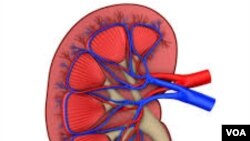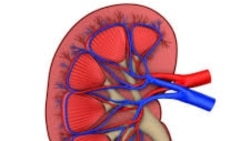Zimbabwe on Thursday joined the international community in marking World Kidney Day amid concerns over the increasing number of people affected by non-communicable diseases.
World Kidney Day is a global health awareness campaign focusing on the importance of kidneys and the reduction of the frequency and impact of kidney diseases. It is a joint initiative of the International Society of Nephrology and the International Federation of Kidney Foundations.
This campaign started in 2006 and is observed annually every second Thursday of the month of March. This campaign has also been adopted by over 90 countries worldwide. The theme for this year is 'Children and the Disease: Move your feet for World Kidney Day’.
Kidney disease affects millions of people worldwide, including many children who may be at risk at an early age.
According to the National Institute of Diabetes and Digestive and Kidney Disease, the main risk factors for developing kidney disease are diabetes, high blood pressure and cardiovascular (heart and blood vessel) disease.
RISING NUMBERS
Zimbabwe has seen an alarming increase in the number of people on kidney dialysis. Also alarming, according to local doctors, is the number of children with kidney ailments in the country.
Dr. Rumbidzai Dahwa, a physician and nephrologist with Harare Hospital, says kidney diseases largely affect one’s quality of life. But she says there are several easy ways to reduce the risk of kidney disease.
“(We are) Advising parents to ensure that their children are involved in activities and exercising, this is not only good for their general overall health, but it’s about creating the time that our kids grow-up with this healthy life-style where exercise is integral part of their day to day living.”
Dr. Obadiah Moyo, chairperson of the Zimbabwe Kidney Foundation and chief executive officer of Chitungwiza Central Hospital, says there are many kidney-related diseases.
“Kidney diseases affect children in various ways and this ranges from treatable disorders to life-threatening conditions and acute kidney diseases develops suddenly and they last usually for a very short time. They can be very serious with long lasting consequences or they could go away completely once the underlying causes have been treated.”
AFFECTED CHILDREN
Tariro (who did not give her surname) is a single mum based in Mutare, Manicaland province, with a six-year old son, Aloiuse, suffering from a kidney ailment. She says the disease has been such a challenge, especially as her son has had to miss school on a number of occasions and experienced bullying from other pupils because of his condition.
“It (kidney disease) really affected him especially when he started going to school. It started when he was going to Grade One last year. He missed all the work, and he hardly goes to school. Even when he goes to school his body is swollen, his head will be so big, his eyes and stomach will be swollen. And some other children will tease him and (this) affected him socially at school, some pupils would bully him socially at school and it is difficult for him to find friends.’’
Alouise, who was given permission by his parents to speak to Studio 7, says he is concerned about his medical condition. “I have a kidney disease, it’s painful, pray for me, injections are painful.”
BATTER SYNDROME
There is an increase in the number of children in Zimbabwe with kidney ailments like Alouise. Harare women, Rudo, says her six-month old daughter is struggling with a rare disease known as the Batter Syndrome.
According to the National Organization of Rare Disorders (NORD) Bartter Syndrome is a general term for a group of rare genetic disorders in which there are specific defects in kidney function. These defects impair the kidney’s ability to reabsorb salt and cause imbalances in various electrolyte and fluid concentrations in the body.
Rudo said, “(She (daughter) was getting dehydrated and we went to the hospital and her condition is actually called Batter Syndrome and it’s a very rare condition and because it’s a rare condition her case is the first in Zimbabwe.
“… And there are so many tests that cannot be to be done in Zimbabwe, a few tests have been done in South Africa. But more tests are needed to be done overseas. Like we need to conduct a sweat test and some genetic tests as well.”
CRITICAL SHORTAGE OF NEPHROLOGISTS
Dr. Dahwa adds that while it is common knowledge in Zimbabwe that the number of people with kidney problems is alarmingly high, there has been a problem in providing statistics as there’s no renal registry in the country due to a critical shortage of nephrologists.
“I can’t actually give you hardcore statistics it’s because we don’t have that information at present. We do have a number of nephrologists so we are looking at how we can start creating this data …”
She adds that “there are presently five adult nephrologists and one pediatric nephrologist serving the whole country.”
Dr. Moyo says the Sally Mugabe Renal Training Institute continuous to train more nephrologist nurses. She believes that there is need for more manpower in this medical field.
“We have been concentrating on the training of nurses, in the training of renal nurses in South Africa with Wits Ransburg University, we have seen the training of nephrologist nurses and up to six nurses have been trained, they have come back and form a core within the institute”
KIDNEY TRANSPLANTS
Dr. Moyo says the Zimbabwe Kidney Foundation is doing all it can to raise awareness among Zimbabweans about kidney disease.
“So, we are working on a plan to have kidney transplants and we are quite well advanced in the preparations and we are working in conjunction with a team from India The Appollo Group of Hospitals. We are looking at a transfer of technology into Zimbabwe.”
He says the Zimbabwe Kidney Foundation aims to provide social assistance and negotiating with the government ensuring that costs of treating the disease do not sky rocket.
“In fact, the main issue at the moment is that all patients not just all under five and over 65 years of age, but for all patients who are arriving at government institutions requiring renal treatment to receive it (medical help) at no cost, just as we do for all patients with TB. They are not charged anything and so that’s what we are aiming for.”
Dr. Moyo further says Zimbabweans should try their best to live healthy lives as this would not only save their kidneys but also their hearts and lives ultimately.
“This disease can also attack anyone, it doesn’t choose, it will go to anyone, whoever you are, you are prone to it (kidney disease) it cannot be refused.”






